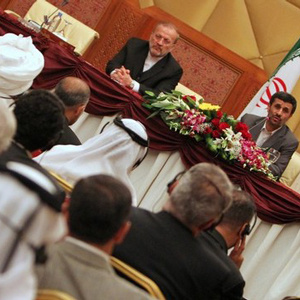Ahmadinejad Does Not Trust the Foreign Minister

JM: What Ahmadinejad has done is unprecedented, either in Iran or in any other country. It is in fact bypassing the administration and structure of the foreign ministry. I believe that Ahmadinejad does not trust the foreign minister, or the ministry, and has decided to devise a new method to control foreign policy. His decision has cast a shadow of mistrust and raised doubts about the efficiency of our foreign ministry.
IRD: It is not the first time an Iranian president has appointed special representatives in diplomacy. Khatami appointed two special representatives on Caspian and Afghanistan affairs. Why has Ahmadinejad’s decision faced serious opposition?
JM: In those cases the representatives were well-known figures from the diplomatic body, were familiar with the task assigned and enjoyed considerable experience in their field. Plus, the intention was to give more weight to the Iranian delegation in negotiations. But Ahmadinejad’s choices are outsiders not from the foreign ministry. They are not professional diplomats, and have no experience in the field.
Moreover, all around the world it is the foreign ministry that is in charge of foreign affairs. According to a law passed in the Iranian Majles [Parliament] in 1984, foreign affairs should fall under the full supervision of the foreign ministry and all other bodies should coordinate their practices with the ministry. So it seems there is no advantage to Ahmadinejad’s decision, and it just adds to the problems we face. By appointing representatives from outside the foreign ministry, the ministry will lose control over an area of its influence and authority, and this could reduce the quality of the foreign ministry’s performance. Embassies will also experience confusion.
IRD: What was behind Ahmadinejad’s decision?
JM: I think he is not satisfied with the foreign ministry’s record. Perhaps he wants full domination over the foreign ministry, but this is not possible with a ministry whose body is formed by experts.
IRD: Ahmadinejad’s move has faced opposition. How significant are the objections?
JM: Look, the ramifications of his decision were so undesirable that even the Leader directly spoke against his decision in a meeting with the cabinet. Parliament also interfered, and 122 MPs sent Ahmadinejad a letter demanding that he withdraw his appointments. Everyone agrees that his act is against national interests.
Although we are not exactly aware of the motives of Ahmadinejad, the outcome of this act would be the neutralizing of the efforts of the foreign ministry and confusion among Iran’s embassies. It would also pave the way for abuse by foreign countries; they would try to bypass our foreign ministry and seek their interests amid the confusion in our diplomatic body.
IRD: How will the government react to the recent wave of protests?

